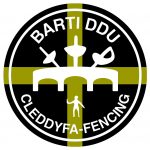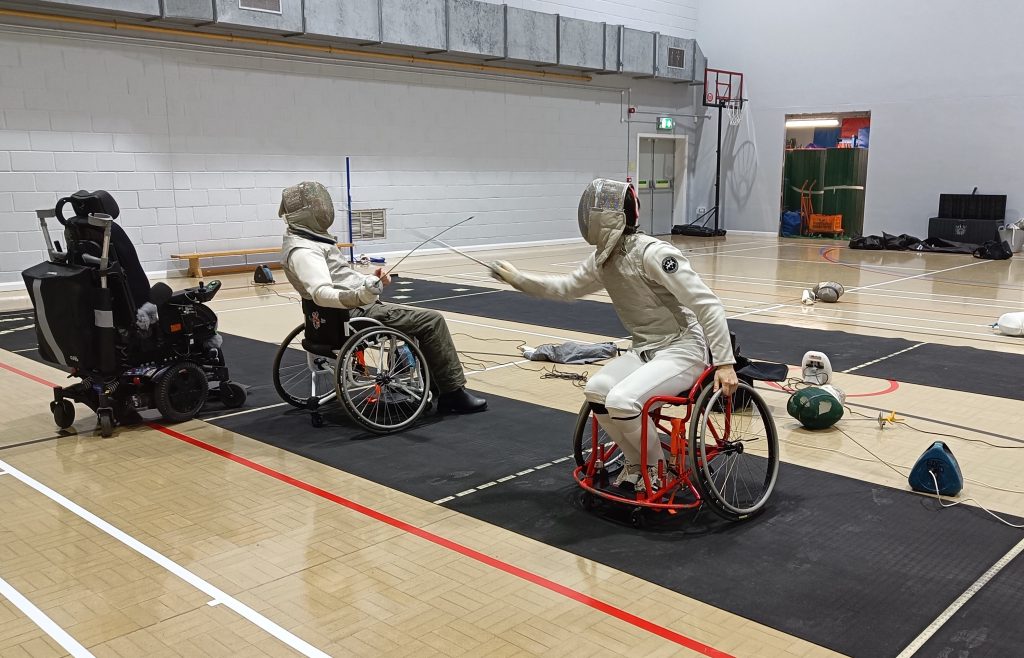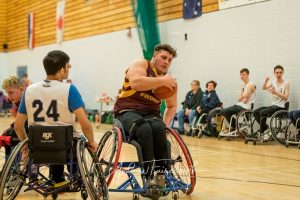

Should you ever visit a small market town called Lampeter, you can expect to find the most rural fencing club in Wales, and one named after a famous local pirate.
Gethin ap Phylip is head coach at Barti Ddu Cleddyfa Fencing (Black Bart’s Fencing Club). If you step inside the training salle, you can expect to meet Oskar, Sam, Amy, Jacob, Eva, Pijus and wheelchair fencer, Derek Wiltshire.

Derek joined the club when Gethin put up a poster in the local milk parlour and dairy shop. Derek said he would like to start fencing, but is a wheelchair user. Derek thought the answer might be no, but if he didn’t ask, the answer could never be yes and then no would always and definitely be the answer.
Gethin replied: “Give me a week”, and went about repurposing some wheelchair basketball chairs in storage at the leisure centre where the club trains. The wheelchairs needed servicing, but because fencing wheelchairs stay static, no bearings needed replacing and Derek was doing sitting fencing in no time.
Derek helps us to picture the salle and its store cupboard with “two racks full of gear and so many foils and sabres – it’s ridiculous!” While the club is small, so is Lampeter. Derek says how special it is to be so close and clustered with people so positive, how it gets him out of the house, and that he loves the swordplay.

Gethin will be volunteering at the Wheelchair Fencing World Cup in Cardiff. He doesn’t drive so will likely have to be getting up before the birds to get a lift to Carmarthen railway station. He compares big fencing events coming to the doorstep to “an ancient court moving around its kingdom.” A sense of place mixed with a sense of occasion.
If you see him on your travels, get him to explain how he has compiled a dictionary of Welsh fencing terms. It’s long, he’ll warn you. He’ll pick out that one of his personal favourites is the Welsh for ‘duck hit’ – crwbanu which translates as … ‘turtling’. Genius. As you wrap your mind around how a swashbuckling turtle might make its neck retract mid-skirmish, Gethin is already describing that he likes to have fun in all aspects because, to him, “fencing is a fun, fair-play, sit-or-stand with a sword, open-skills sport.”
Fencing spans polar points; the compass needle spins south-west to north-east.

A hundred and ten miles up the A438 lies Wrexham Fencing Club. Amongst a few Hollywood guests and the ‘other’ Wrexham FC, there you’ll find Mike Evans-Jones – now thirty-four years-old – who took up fencing when he was about ten or eleven.
He remembers the big, smiling, welcoming OBE-honoured Wrexham coach Mike Norfolk. He remembers standing, wide-eyed, in the door of the fencing salle with his father, watching fencing for the very first time. He remembers Mike being the most amazing presence and inspiration. He remembers thinking “I want to be like him”.
Mike recollects the mysterious, magnetic mechanism that the Welsh call hiraeth; the deeply-rooted sense of longing which called him back to Wales. He left a job in business and finance in London, retrained as a PE teacher, and now holds a position on the Board of Welsh Fencing, as well as being head coach at Wrexham.
Mike’s is keen to shape a modern ‘epic’ for fencing in Wales and has been part of creating an Athlete Development Programme in Welsh Fencing to form a purposeful pathway for the fencing community.
Wanting to bring to life the emotional value of the sport, Mike made use of a solidly and symbolically Welsh emblem. “We have summed up our spirit in ‘Y Ddraig’ – Welsh for ‘The Dragon’. Y stands for You; D is for Dedicated, the next D for Decisive, R for Resilient, I for Innovative and G is for Genuine. We’re encouraging athletes to be dedicated to their passion, make brave, clear decisions, commit and overcome challenges, push themselves to work towards their dreams, discover new ways to develop and genuinely be themselves.”
To see how the athlete’s voices resound with this thinking, Mike advises to speak to Steph Phennah. Now, twenty-two years old and working to qualify as a solicitor, sabreur Steph is working in Wills and Probate but heading over to Civil Litigation next year because “that’s a bit more fiery, and I am all about that.” She’ll still help out at Wrexham on a club night if she can. Mike started coaching her when she was ten or eleven and coached her on international trips – like the time she went to Vienna and forgot to pack her breeches so had to borrow a sweaty pair from one of the boys’ team who had fenced the day before.
Never mind – it still gives her and Mike a laugh. And Steph will say how that kind of memory and others are what have “grown me as a person into who I am today.” Like the time when she made it onto the podium at the British Youth Championships, winning her quarter-final 15-14, her semi-final 15-14 and losing the final 15-14. She was forced to flip how she felt, and transform the disappointment at not having the gold medal into triumph that she’d won the silver. Steph says that’s really important: having the confidence to know where you stand; understanding your sense of place in the world.
Mike’s voice will also lilt and lift when he tells you of the Polish family at the Wrexham club. Eleven-year-old Nataniel, his nine-year-old sister Rozalia and their father Andrezj do all fence, with sabre as their weapon, but their mother, Kinga, keeps watch. She says she has already lost a lamp in the living room to those three bringing their practice exercises home and she’s now feeling “a little nervous and protective about the TV.”
Nataniel loves fencing and says that once you pick up a sword you love it and that feels like “a tap that can never be turned off.” Rozalia likes to get points off her brother at club and Andrezj likes the company of other fencers and families whether at training or when he takes the children to competitions. It’s been a godsend; fencing has brought them joy and belonging.
Mike sees a modern sporting landscape emerging and knows to embrace change. “We have to be innovative in the way we coach and tailor the sport to the athlete; not the other way round.” Derek sees this world, too. One that will accommodate and adapt to needs and to circumstances – to people. For Gethin, this kind of thinking is second nature. He was over the moon that Amy at his club was selected for Wales at the Five Nations but he values all the fencers one and the same. Nataniel is going to be Welsh Olympic Fencing Champion. Rozalia smiles – she doesn’t know yet.
Another family already trained in how to protect the furniture and fittings are the Russells down in Cardiff. Dad, Matt is chair of Welsh Fencing and he can “throw a sabre around with no talent whatsoever.” Luckily his wife, Saskia is a late-entry epeeist who took it up seeing if she could enjoy it as much as their daughters – who had already discovered the draw of the sword. Eighteen-year-old Amelie and fifteen-year-old Ellie compete internationally; taking themselves from Wales to Grenoble, onto Klagenfurt, to Laupheim, to Budapest.

There is so much still to do in growing the grass from the roots all the way up to the elite Paralympians that Wales feed into GB teams. Sport Wales found that there are seven thousand Welsh school-age children with a disability or impairment who take part in physical activity once a week or even less. Matt says that there’s no more fun to be had on this earth than hitting with a pointy stick. “Just build the right culture; fencing can welcome, include and engage parents and wider communities. It’s an easy-to-follow recipe.”
Perhaps you’re familiar with that story; how sport has long-since been a lifeline, a connection point. Fiona Reid, Chief Executive Officer at Disability Sport Wales, says the hope on the horizon is that nobody of any ability should have to feel surprised or grateful to have access to sport. She grew up playing badminton – with wonderful coaches, with both her parents as coaches, becoming a coach herself when she was still only young. Her hymn is that sport should be for everyone “the trick is being innovative enough to make it that way.”
Sitting fencing is perfect in that regard. Mike reports that it made him think of weapon comparisons; that if you equate epee with middle-distance running then sabre is a 100-metre sprint and foil is somewhere in between, but “seated fencing is a five metre sprint; it’s so fast – you could say it’s the Formula One of all the fencing disciplines.”
Fiona details how trying to tune disability sport into community was once a little like belonging to a small group of soloists. Determined to keep handing out the sheet music so as to inspire a greater anthem of participation and harmony, she’s now starting to detect a returning echo. She says that she’s looking forward to the day when she can stop singing, when she can turn around to see and hear a growing choir in chorus; and how magical that sight and sound will be.
Wales is home to gifted story-crafters, putting words to lived experience; singing them aloud. It is a vocal tradition like Under Milk Wood – Dylan Thomas’ creative response to a world reeling from the ravages of war. While his Play for Voices mourns the passing of a simple, innocent way of life, the characters’ spirited speech swells with the hopeful possibility that beauty and integrity still exist.
Siân Hughes Pollitt

Sign up to receive regular highlights from the exciting world of fencing - celebrating the best of our unique and inspiring community